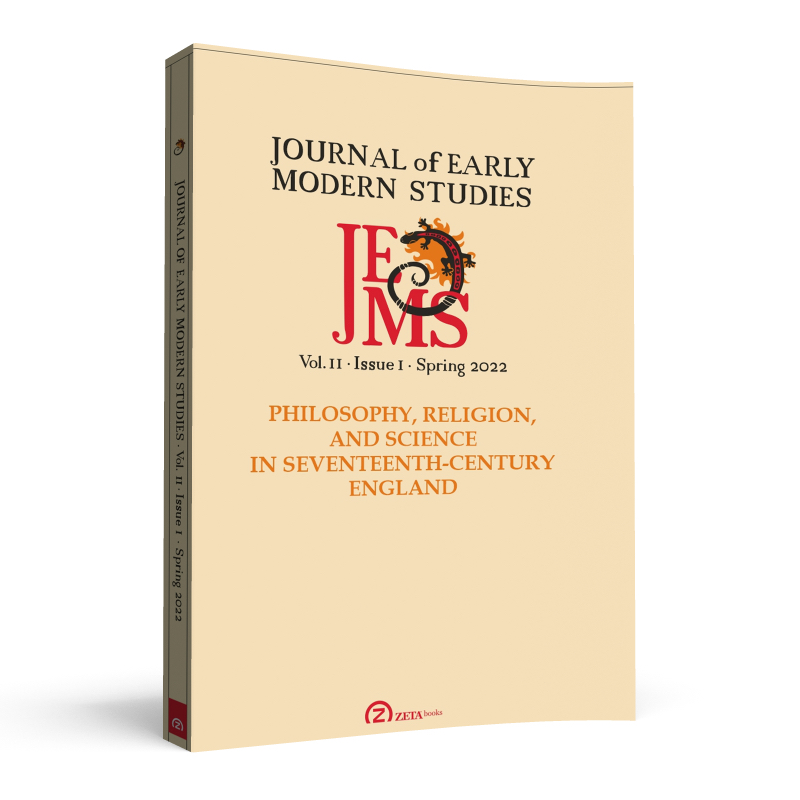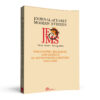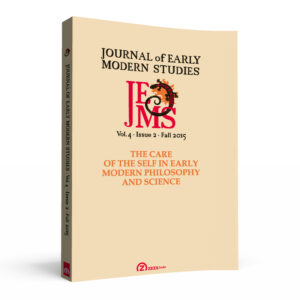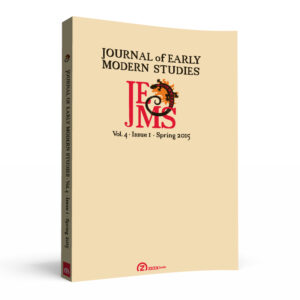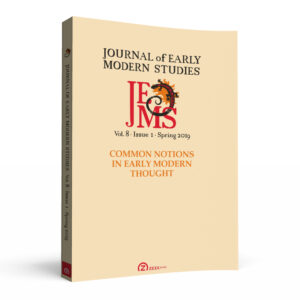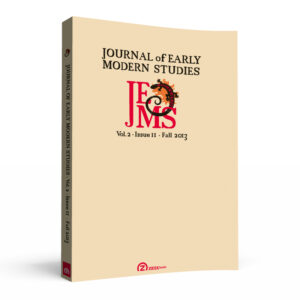Journal of Early Modern Studies, Volume 11, issue 1 (Spring 2022)
ISSN: 2285-6382 (paperback) / ISSN: 2286-0290 (electronic)
CONTENTS
ARTICLES:
Sorana Corneanu, Benjamin I. Goldberg and Diego Lucci: Introduction [OPEN ACCESS]
https://doi.org/10.5840/jems20221111
Daniel Schwartz: Francis Bacon on the Certainty and Deceptiveness of Sense-Perception
https://doi.org/10.5840/jems20221112
Abstract: There is an important tension within Francis Bacon’s discussions of sense-perception. On the one hand, he sometimes seems to regard sense-perception as a certain and unquestionable source of information about the world. On the other hand, he refers to errors, faults, desertions, and deceptions of the senses; indeed, he aims to offer a method which can remedy these errors. Thus, Bacon may appear conflicted about whether sense-perception provides reliable information about the world. But, I argue, this appearance of a conflict is itself illusory. Bacon offers us a coherent and compelling account of sense-perception that acknowledges not only its weaknesses but also its strengths. I explain his account by exploring its roots in the atomist and natural magic traditions, drawing special attention to the similarity between Bacon’s response to skepticism and earlier atomist responses to skepticism. One of the key features of the view is the analogy between sense organs and scientific instruments, both of which infallibly register information based on causal principles.
Keywords: atomism, epistemology, Francis Bacon, sense-perception, skepticism
Benjamin I. Goldberg: Concepts of Experience in Royalist Recipe Collections
https://doi.org/10.5840/jems20221113
Abstract: This essay explores the idea of experience and its epistemological and practical role in maintaining the health of a household among early modern English Royalists. A number of prominent royalists during the mid-seventeenth century British Civil Wars expended quite some effort in the collection of medical recipes, including Queen Henrietta Maria herself, as well as William and Margaret Cavendish, and the Talbot sisters—Elizabeth Grey and Alethea Howard. This essay looks at these Royalists and four of their collections: three published (Henrietta Maria, Grey, Howard), and one manuscript (the Cavendishes), in order to determine how they conceptualized experience and its role in medical practice. The claim that such recipe collections represent a new, anti-Aristotelian idea of experience as a specific, particular event is disputed through a quantitative and qualitative analysis of these collections. Instead, it is argued that there a number of related conceptions of experience found in these Royalist recipe collections, but the basic idea is one where experience indicates long experience or expertise, an idea that can traced back at least to humanist medicine of the Renaissance, and likely back to Galen.
Keywords: early modern medicine, English royalists, experience, experiment, household science, medical reform, recipe collections, trial
Iordan Avramov: The Correspondence of Henry Oldenburg and Book Reviews in the Philosophical Transactions, 1665–1677
https://doi.org/10.5840/jems20221114
Abstract: The book reviews of the early Philosophical Transactions have not been considered a dominant feature of the journal, and thus more research is needed to enrich our understanding of them. This paper begins this process by describing some of the basic features of the reviews, before moving on to address the issue of how they were composed. The specific focus here is on how Henry Oldenburg’s correspondence influenced the process, especially on how it affected this process in variable and various ways. As it turns out, there are episodes when Oldenburg’s exchanges impacted the timing, length, content, form, and sometimes even the very existence of the book reviews. It thus seems that these reviews were rooted just as much in epistolary correspondence as other texts published in the Transactions.
Keywords: book reviews, early modern scientific correspondence, Henry Oldenburg, Philosophical Transactions, Royal Society of London
Bogdan-Antoniu Deznan: The Eternal Truths in Henry More and Ralph Cudworth
https://doi.org/10.5840/jems20221115
Abstract: The thorny issue of the created status of eternal verities, a hypothesis initially promulgated by Descartes in his 1630 correspondence with Mersenne, generated widespread debates across confessional lines in 17th century philosophical and theological circles. At stake was not only the necessary or contingent status of these truths, and thus God’s relationship with creation, but also the very nature of the Deity. This was certainly the case for the Cambridge Platonists Henry More and Ralph Cudworth. Both were early advocates of Descartes’ philosophy, while still critical of some of its assumptions. The doctrine of the creation of eternal truths represents such an instance, and it was a highly sensitive topic for both. I shall propose a scholastic context in which to situate some of their ideas in order to shed some light on how this issue was addressed in More and Cudworth. The position where eternal truths are arbitrarily instantiated by the mere fiat of God is avoided by the Cambridge Platonists in two ways. First, the immutable, necessary, and eternal status of these ideas is safeguarded by the premise that they are intrinsic to the divine essence insofar as it is intellectual. We shall see that this raises a question concerning their precise ontological status. Second, the function of these ideas as the framework of the created order is guaranteed by the perfection of the divine will. This will require a clarification of the causal relationships existing between eternal truths, God, and the realm of creation.
Keywords: Cambridge Platonists, eternal truths, God, Henry More, intellect, Ralph Cudworth, will
Diego Lucci: Locke and the Socinians on the Natural and Revealed Law
https://doi.org/10.5840/jems20221116
Abstract: After the publication of The Reasonableness of Christianity (1695), several critics depicted Locke as a follower of the anti-Trinitarian and anti-Calvinist theologian Faustus Socinus and his disciples, the Polish Brethren. The relation between Locke and Socinianism is still being debated. Locke’s religion indeed presents many similarities with the Socinians’ moralist soteriology, non-Trinitarian Christology, and mortalism. Nevertheless, Locke’s theological ideas diverge from Socinianism in various regards. Furthermore, there are significant differences between the Socinians’ and Locke’s views on the natural and revealed law. Socinian authors thought that Christ’s Gospel had superseded both the Law of Nature and the Mosaic Law. Therefore, they endeavored to follow the Christian imperative of non-violence and favored pacifism. Moreover, they maintained the divine origin of political authority and asserted absolute obedience to the magistrate, thereby rejecting the right to resistance and revolution to the political power. Conversely, Locke argued that first the Law of Moses and then the Christian Law of Faith had restated the God-given, eternally valid, and universally binding Law of Nature, which Christ had complemented with revealed truths concerning the afterlife and divine mercy. Thus, according to Locke, under the Christian covenant the protection of the self’s and others’ natural rights from abusive individuals or oppressive rulers is still a right and a duty to the Divine Creator and Legislator.
Keywords: Bible, Christian revelation, John Locke, natural law, resistance, revolution, self-defense, Socinianism
Pierangelo Castagneto: Algernon Sidney and the Republican Tradition in Jeffersonian America
https://doi.org/10.5840/jems20221117
Abstract: During the second term of Jefferson’s presidency, with Europe and the world ravaged by the Napoleonic Wars, it became extremely difficult for the young Republic to defend the principle of sovereignty from the threats of France and Britain. In response to attacks on American shipping, in 1807 Congress passed the Embargo Act, an economic measure designed to convince the two belligerents to respect U.S. neutrality by cutting off American shipping to all foreign nations. This controversial decision, firmly opposed by the Federalist Party, received strong support from one of the most fervent Jeffersonians of the time, Gideon Granger (1767-1822). A lawyer from Connecticut, Granger wrote An Address to the People of New England (1808) under the pseudonym of Algernon Sidney, where he reintroduced into public debate some of Sidney’s archetypal themes, emphasizing the natural right to oppose abusive power and the vital necessity to preserve republican virtues in order to drive away moral and political corruption.
Keywords: Algernon Sidney, commerce, embargo, Gideon Granger, rebellion, republicanism, resistance, Thomas Jefferson
Review:
Thomas Brochard: Gerhard Seibold, 250 Jahre Stammbuchgeschichte. Inskriptionen und Bildschmuck, Wien: Böhlau Verlag, 2021.
https://doi.org/10.5840/jems20221118

